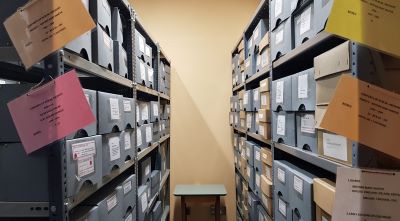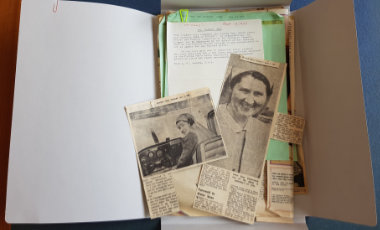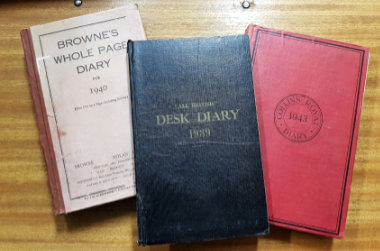Recording the Past and inspiring the Future
by Lisa Murphy, MMM Archivist 02.11.2021
 An introduction to MMM Archives
An introduction to MMM Archives
In July of 2021, I took up the mantle of Congregational Archivist for the Medical Missionaries of Mary. However more often than not, when I tell people that I am an archivist, I am met with blank stares. I have found that the role of an archivist is not widely understood and this in turn leads to a lack of understanding about the purpose and importance of archives themselves. To that end, I would love to give you a sense of what exactly an archivist is, what we do and why the MMM Archive is so precious.

So what is an archivist?
The official definition states that an archivist is an information professional that collects, arranges, preserves and makes available records of enduring value which have been selected for long term preservation in the archive. Archives can be defined as the documentary by-product of human activity and can include a wide variety of records such as paper documents, photographs, audio and film recordings, artefacts and an ever increasing amount of digital files. Archivists often work within a variety of institutions and organisations including National Archives, local authorities, libraries, galleries, and private businesses.
In practice, the archivist within an organisation must make decisions on what material will be kept as archives. Then, they will create archival catalogues which describes this material and allows it to be easily located. The archivist must also ensure that the material is stored in such a manner that it will be preserved and accessible for the long term. This means using archival quality boxes and folders and ensuring that potentially damaging metals and plastics are removed from the records.
Archivists often wear many hats in our jobs and we are also trained as records managers. This means that we are responsible for the effective management of the information that is received and generated by the organisation every day. It is our job to understand the types of files that are being created by an organisation on a daily basis and make decisions on which files will be retained to go to the archive in the future. So while much of the work of the archivist is concerned with preserving the past, we must also think of the future and what material will ultimately become archives.
The Congregational Archive
The Medical Missionaries of Mary Congregational Archive is located at the Motherhouse in Drogheda and is directly linked to the mission of the Congregation by being the repository of evidence for the work, healing charism and collective history and memory of MMM’s worldwide. The MMM Archive contains paper and digital documents, photographs, publications, ephemera, artefacts and other records relating to the foundation and development of the Congregation since 1937, the work and life of MMM Sisters, the development of its governance structures and healing charism and the contribution of women religious to health services. The archive also contains records of the contributions of significant persons both within the Congregation and associated with it.

In essence, the MMM Archive is the memory holder for the Congregation, preserving the legacy of Mother Mary and the work of MMM Sisters both past and present. It is often said that if you do not understand where you came from then you do not know where you are going and archives assist us in that understanding of where we came from. The records held within the MMM Archive provide us with a picture of the immense courage of the foundress and founding members. They also illustrate the difficulties experienced in a young Congregation taking root in a cross-cultural Mission, and the unfolding of its Charism in response to the needs of the time. We also hold the records of all subsequent Congregational Leadership teams which allows us to trace the development of the Congregation and its work over time. But perhaps most important of all, are the affective records created by MMM Sisters such as diaries, memoirs and photographs which provide us with insights into the social, emotional and spiritual aspects of MMM life. I would encourage all MMM Sisters to retain records of their work and life so that in future they may become a part of the archive and ultimately the wider MMM story.
The work continues apace here in the archive to ensure that the inspiring legacy of MMM is preserved, while also facing into the challenges of working in an increasingly digital environment. At a recent archival seminar on Catholic archives I was struck by a quote that said ‘Archives record the past, inform the present and inspire the future’. As Congregational Archivist, my hope for the future is to continue to capture the spirit and story of MMM’s worldwide so that the MMM Archive is representative of all MMM’s and where they have come from, their experiences across the globe today and maybe provide a little inspiration along the way.
{loadposition socmod4}
SEE ALL BLOG POSTS
